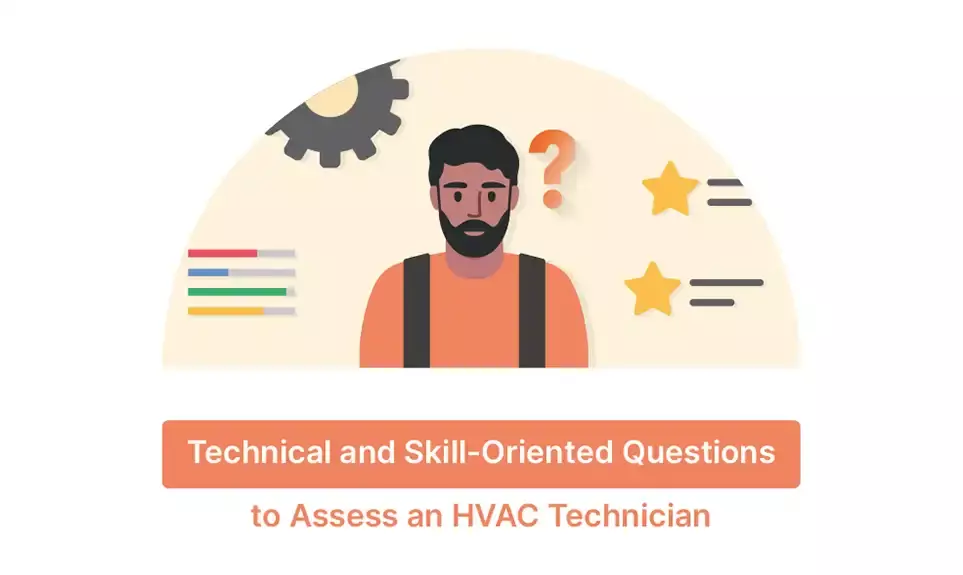When hiring an HVAC technician, it is necessary to find someone with the right mix of technical knowledge and skills. In our first article, we listed common questions you would want to have at hand for any interview of a new HVAC technician.
If you have not read it yet, you can find it here. Today we will focus on questions you can use to assess technical knowledge and determine what skillsets a prospective HVAC technician might possess.
Technical knowledge interview questions
An HVAC technician needs mechanical knowledge to perform repair tasks quickly and efficiently, but they should also be able to perform these services while promoting a safe work environment.
You may know from their resume that a candidate has higher educational qualifications, certifications, and training—but asking technical questions is not a waste. Asking technical questions can help you understand how they interpret a concept, its significance, and if this differs from your understanding.
Engaging in a conversation about HVAC technologies can better understand the candidate’s knowledge of safety protocols, electric codes, and regulations. Taking the time to probe a little deeper and understand how much a candidate knows (or does not) is always a wise course of action.
Here are some example questions you might use in an HVAC interview to gauge technical understanding:
- What are the types of repairs?
- What is a geothermal system?
- What are the essential types of HVAC maintenance?
- What is the basic working principle of an air-conditioning system?
- What are the components of an HVAC system?
- If a refrigeration system faces an issue, what would be the possible reasons?
- Explain the safety procedures and rules followed on job sites.
- Can you explain the troubleshooting process in electrical wiring?
- What are the HVAC industry’s local, state, and federal regulations?
- What is meant by the national electrical code?
Skill-oriented interview questions
Similarly, by asking skill-oriented questions, recruiters can evaluate a candidate’s strengths and weaknesses in a particular area. Determining skill sets and personality traits is valuable for recruiters trying to make sure that applicants have the required abilities to perform various complex jobs and perform them well.
Skill-oriented interview questions are a great way to gauge a candidate’s soft and hard skills. By probing a little deeper and finding out how they have handled things in the past, it will give you some insight into how they may take things in the future. The following questions will be handy when assessing a new candidate, so keep them in mind.
1. What skills do you possess that qualify you to be an HVAC technician?
By asking this question, you can learn several things about the applicant. First, you get to see if they can identify the skills you consider most relevant to the role. Secondly, the candidate may surprise you by telling you about skills they have that, while applicable to the job, you never even considered.
Asking an applicant “what qualifies you” allows you to quickly find out not just if they have the expected qualifications like certification and education but also what about them is unexpected.
2. Tell us about your accomplishments/achievements in your previous company, if any.
This question provides insight into how situations outside the norm might be handled. Things don’t always go smoothly, and complex or stressful situations can crop up at unexpected times. Asking a candidate about past accomplishments and achievements lets you know whether they are easily fazed or take things in stride. By asking this question, you are also providing an opening where they can talk about things they take pride in or that pushed them and what they learned from these experiences.
3. What are your thoughts on multitasking, and tell us your experience, if any?
HVAC service technicians perform various tasks—some simple, some complex. Knowing the relationship, a candidate has to task-switching and if they can do so efficiently is an ability you should be aware of. People who can effectively switch between tasks without sacrificing safety or quality are a boon to any company; employees with this ability help keep overall productivity high and compensate when other techs need to focus on more specialized work.
Asking a candidate about their relationship with multitasking can help you understand if they are better at the deep focus that some projects require or if they are in a position to help keep things on schedule by splitting their attention between multiple smaller projects.
4. How do you explain a technical issue to a customer?
Communicating complex technical information is not always easy—especially if you are talking with a non-technical person. Being able to simplify and put things in terms that a layperson can understand is a gift not everyone has. Be on the lookout for techs who can do this and do it well.
Having one or more techs on your team with a knack for this gives you a resource you can draw on when a customer is not understanding. A tech you can turn to when things need to be clarified can be a godsend—even more valuable. Sometimes they can help other technicians become better at communicating with these more challenging cases by sharing their strategies and explaining their approaches.
5. How well do you work with a team?
An HVAC technician has to work with a team. Some people love being part of the hustle and bustle of a team environment, while others are more comfortable working alone. And some people, while favoring working alone, can be great mentors to less skilled technicians. By asking how well an applicant works with a team, you gain insight into whether the candidate is suited to join your team and where they fit in.
6. How do you handle a fast-paced work environment?
A fast-paced environment can be overwhelming at times. HVAC technicians have to juggle various tasks while maintaining a sense of priority. What needs to happen first? What can wait a little bit? Being pulled in different directions is a complicating factor, and other people react to it in different ways. Asking how a candidate relates to a fast-paced environment gives you a sense of what you are getting into.
While some people thrive in a fast-paced environment, others are hindered by it—things are coming at them too fast to make sense of. A lucky few do just as well in a fast-paced environment as they do in slower-paced ones; they adapt easily to the needs of the moment. All of these work styles have their place, and by asking up-front, you get an opportunity to assess your compatibility with each other.
7. Are you able to manage time effectively?
By providing a hypothetical scenario similar to what your technicians experience during an average work day—and asking the candidate to explain how they would approach it—you gain insight into their ability to organize and prioritize. A technician who can get their work done professionally, effectively, and on time is highly sought after. Asking how they manage time is essential when evaluating candidates.
8. How do you approach a situation when you are given minimal instructions about a job?
HVAC technicians have to rely on their manager’s instructions. But sometimes, they are short on time and unable to provide instructions to their techs that are as clear or complete as they should be. What this question is asking is, what happens next? Is the candidate comfortable asking for clarification and assistance when not understanding the instructions? Hopefully so.
In situations where a manager or other tech cannot provide additional background, is the applicant able to do their own research? Knowing how they answer this question helps gauge whether the candidate is self-reliant and if they might be able to serve as a resource to technicians who are less comfortable with research.
9. Do you take responsibility for handling a task yourself or give it to someone else?
Having a technician who delegates tasks is not always a bad thing. Sometimes it is exactly what you want. The trick is striking a balance between when something should be kept and when it should be handed off. Wanting to take responsibility for a project and see it through to the end is admirable, but if holding onto that task is causing other things to back up, it may be the wrong call.
On the other side are people who delegate too quickly—either because they feel someone else is better qualified or they just don’t want to do it. The problem with passing things on too quickly is it deprives techs of the opportunity to become better and improve in areas of weakness—and you do want them to improve. But finding the sweet spot between two extremes can be challenging, and some people are better at finding it than others. These are the techs you want.
Keep your eye out for the techs willing to hold onto a project but aware of when they are out of their depth. These techs will struggle with a problem for a while–and hopefully, resolve it–but also know when to call in reinforcements.
10. If you cannot complete a job order within a time, what is your approach?
Customers have expectations when it comes to completing job orders. Most of the time, a technician can deliver on time, but sometimes it just isn’t possible. In situations like this, how does the applicant handle it? Ideally, a candidate can gracefully acknowledge the failure and offer reasonable solutions to the customer.
By asking this question, you can see how a candidate will behave with a customer when things don’t go to plan. It is essential to know if you are dealing with an applicant who can be diplomatic but still set reasonable expectations—or someone likely to add to a customer’s frustrations.
11. How do you improve your skills to become more successful?
Self-improvement is an important part of professional development—people who are constantly striving to do better. On-the-job is a fine place to start, but by asking applicants how they improve their skills, you find out if there are things outside of work that they are doing.
Is the applicant continuing their education by attending seminars or pursuing additional coursework? Are they members of any professional organizations? Do they follow industry news sources and keep up to date about what is new or what changes to expect in the future?
Candidates who follow the trends and work to keep themselves up-to-date not only age better as employees, they are in a position to pass on what they have learned to other technicians.
12. How good are you at problem-solving?
This question does not tell you how good a candidate is at problem-solving; it tells you how good they think they are. But this is not necessarily a bad thing. While it is possible to be bad at problem-solving and think you are good at it, the reverse is seldom the case—so most of the time, this question will point you in the right direction.
Next, you can probe a little deeper. Ask the candidate about their real-world experience with problem-solving and how they experienced things internally. You should now be getting a better sense of how thoughtful and self-aware the candidate is, and if their approach to problem-solving is likely to resolve the problems they will encounter in the field.
Conclusion
Choosing quality interview questions can be challenging, so it is always good to have a few picked out in advance when meeting a new candidate. Hopefully, our explanations regarding why you might choose some of these questions made sense to you. We think they will make it easier to assess potential technicians in a meaningful way and hope that they lead not only to hiring better people but also to improved employee retention.
Now that you have covered commonly asked interview questions, technical knowledge, and skill-oriented questions—take a breather. When you are ready, tackle the last article in our series; you can find it here. See you soon.



